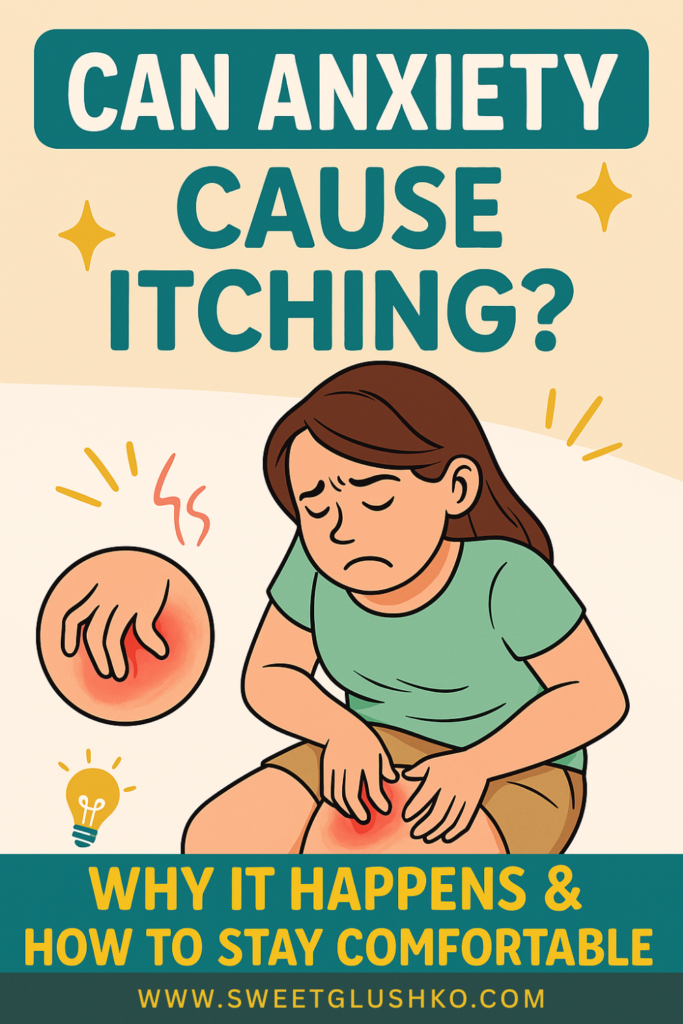Anxiety is not just a mental or emotional challenge—it can also manifest through physical symptoms. One such symptom is itching, which can occur on various parts of the body, including the arms, legs, face, and scalp.
Stress and anxiety can trigger the release of certain chemicals in the body, such as cortisol and histamine, which may lead to skin irritation, increased sensitivity, and persistent itching. While anxiety-related itching is not caused by an underlying skin condition, it can still be uncomfortable and distressing. Understanding the connection between anxiety and itching can help in managing both the mental and physical aspects of this condition.

- How Anxiety and Stress Cause Itching
- Common Symptoms of Anxiety
- How to Identify Itching Caused by Anxiety
- Home Remedies for Anxiety Itching
How Anxiety and Stress Cause Itching
Anxiety and stress can manifest in various physical symptoms, including itching and burning sensations on the skin. When the body experiences stress, it triggers a stress response that affects the nervous system, leading to heightened skin sensitivity and irritation.
A 2019 study examined anxiety levels across different age groups, ranging from 18 to 65 and above. It found that the highest severity of anxiety-related symptoms was observed in individuals aged 18 to 29, with severity decreasing in older participants, particularly those aged 65 and above.
Dr. Elizabeth Lombardo explains that anxiety-induced stress can overstimulate the body’s nervous system, leading to nerve-related symptoms such as skin burning or itching. This sensation may occur anywhere on the body, including the arms, legs, face, and scalp. Stress-induced physiological changes, such as hormonal imbalances and nervous system modifications, can further contribute to these unpleasant sensations along one or more nerves, resulting in persistent itching or burning.
Understanding the connection between stress, anxiety, and itching can help in managing symptoms more effectively and reducing discomfort.
Common Symptoms of Anxiety
The mental symptoms of anxiety include:
- Racing thoughts
- Uncontrollable over-thinking
- Difficulty concentrating
- A feeling of panic
- Irritability
- Heightened alertness
- Sleep problems
- Changes in appetite
- Dissociation
Some physical symptoms of anxiety are:
- Sweating
- Heavy and fast breathing
- Hot flashes
- Dry mouth
- Shaking
- Hair loss
- Fast heartbeat
- Lack of energy
- Dizziness and fainting
- Stomach aches
- Itching
A study published in 2021 highlighted a significant increase in anxiety levels since the COVID-19 pandemic. It compared anxiety prevalence among U.S. adults in the NHIS 2019 survey (30,915 participants) with the UAS 2020 survey (8,022 participants). Reported anxiety symptoms rose from 8.1% in 2019 to 21.4% in 2020. While levels fluctuated, they remained at least 3% higher than pre-pandemic levels throughout 2020.
How to Identify Itching Caused by Anxiety
Itching and anxiety can sometimes be unrelated, as anxiety alone rarely causes itching without other accompanying symptoms. Determining whether anxiety is the root cause of itching can be challenging and may require a comprehensive medical examination. Below are some common causes of anxiety-related itching:
- Stress Hives: Hives are itchy bumps that typically result from an immune system reaction to allergens. However, stress and anxiety can also trigger hives. Practicing stress-reducing techniques such as deep breathing or mindfulness, along with using home remedies like baking soda, aloe vera, or coconut oil, may help soothe the skin.
- Sweat Rash: Anxiety increases sweating, which can lead to sweat rash or heat rash. While harmless, these rashes can be extremely itchy and may last up to two weeks.
- Triggered Itch: Anxiety can worsen pre-existing skin conditions such as eczema and psoriasis. Stress is known to be closely linked to flare-ups of these skin conditions, making itching more severe.
- Worsened Itch: Anxiety can heighten the perception of an itch, making a minor irritation feel more intense. It can also cause sensations similar to itching, such as tingling or crawling sensations on the skin.
If itching persists or worsens, it is advisable to consult a medical professional to rule out underlying skin conditions or other health concerns.
Home Remedies for Anxiety Itching
- Keep fingernails clipped to reduce the risk of infections from scratching.
- Apply calamine lotion or an over-the-counter corticosteroid cream to soothe irritation.
- Avoid scratchy clothing, hot baths, direct sunlight, and other potential irritants.
- Use fragrance-free moisturizers daily to prevent skin dryness.
- Use a humidifier to maintain moisture levels in the skin.
- Wear gloves or cover affected areas to avoid excessive scratching.
Medical and Therapeutic Treatments
Doctors may recommend selective serotonin reuptake inhibitors (SSRIs) to help control chronic itching linked to anxiety. Light therapy is another treatment option that may provide relief for stress-induced itching.
Stress-Relief Techniques
Practicing relaxation techniques can help reduce anxiety-induced itching. Some effective methods include:
- Deep breathing exercises
- Meditation and mindfulness
- Yoga and stretching
- Acupuncture
Maintaining a balanced diet, getting enough sleep, and engaging in regular exercise can also help regulate stress levels. Seeking therapy, such as behavior modification therapy, may further aid in anxiety management.